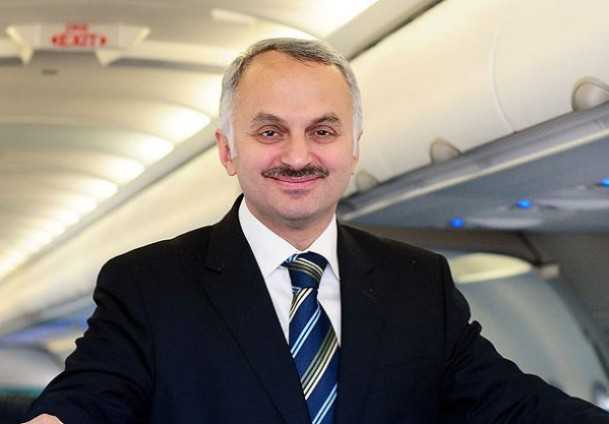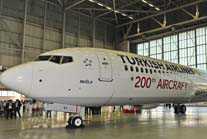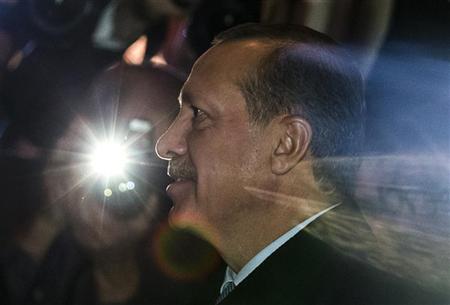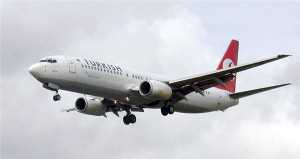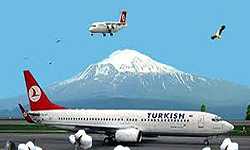Slumbering with the ebb and flow of airlines, I have flown the foolishness of dreams. Since my first overseas flight to Africa in 1973, I’ve watched so many carriers vanish or be swallowed. Pan Am is the poster child, the mighty carrier upon which I first winged around the world. The Alexander Calder-painted planes of Braniff made my flights to South America vibrant and bright. I joined the mile-high club on UTA on a flight from Tahiti to Easter Island. Zambia Airways got me to Victoria Falls, where I made the first descent of the Zambezi back in 1981.
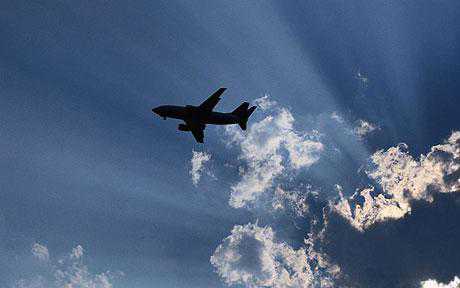
All are gone now, just contrails of memories. And that doesn’t include the U.S. carriers, such as TWA, National, Western or Eastern. Since commercial air travel began, more than 130 airlines have started and folded in the United States alone.
KLM was the carrier I used to get to Arusha, Tanzania to climb Kilimanjaro, but it was acquired by Air France in 2004. Swiss Air, which carried me to the Eiger, was picked up by Lufthansa. And of course Northwest folded into Delta, Continental into United and the dance continues.
Why do so many airlines, lifted with initial promise and hope, end up shuttered or absorbed on the ground? Sometimes it is bad luck or timing, politics or bad business decisions. However it begins, when an airline starts its descent, it is difficult to lift the nose and wheel the clouds again.
In 1978 I set out to make the first descents of the Euphrates, which spills from Mount Ararat and snakes its way into Syria; and the Çoruh, which cuts along the Karadeniz Range and efflues into the Black Sea. The most efficient way to get to these waterways falling off the Anatolian Plateau was via Turkish Airlines, which offered flights to Istanbul from New York. Memory plays tricks and bends the light of time, but I recall it being among the worst air experiences ever.
The plane was packed and unpleasantly fragranced, the food unappetizingly alien, the windows sooty and I was seated in the non-smoking area, which consisted of the final two rows before the bathroom, with a curtain separating me from mixing clouds of cigarette fumes. I coughed through much of the flight. This was not an airline, in my mind, with a big future.
Today, of course, airlines everywhere are scaling back service and unraveling ways to charge customers for every amenity once de rigueur. So, it is with delectation I can report that no airline has roared back so exceedingly as Turkish Airlines, and it has become part of an elite club of the best carriers in the world.
My flight of the Phoenix was last month, after researching the best way to get from Los Angeles to Delhi, where I planned to connect to Ladakh to make an expedition down the Zanskar River. Air India, which was plagued by a pilot strike for much of the summer, flies via Frankfurt, a sterile stopover. Emirates connects via Dubai, but it is expensive, and the city has no soul. But Turkish Airlines offers up a smooth connection via Istanbul. Istanbul? Where time seems like syrup, the city often cited as the most beautiful in the world. Why, then connect directly through? It seemed the ideal layover to shed some jetlag and soak in the snaking sounds and exotic perfumes of Asia Minor before heading onwards. So, with some residue of trepidation from 40 years back, I take the chance and book a business class seat, LAX-Delhi, with an overnight in Istanbul.
And so it is with some Turkish delight I board a brand new Boeing 777-300 ER and find my way to a seat as comfortable as a La-Z-Boy, with a hot towel and sparkling mimosa waiting. The toiletry kit looks like an iPad briefcase — biggest I’ve ever seen — and is filled with Crabtree & Evelyn accoutrement. Everything is clean, gleaming like a needle, a far cry from my remembrances of an ashen interior. Then a man wearing a crisp white uniform and chef’s hat, signatures of multi-star restaurants everywhere, appears and hands me the menu and a tray of Godiva chocolates. He’s Gökay Kizilok, the “Flying Chef,” veteran of two celebrated earthbound restaurants in Istanbul, and he says he will create made-to-order dishes during the flight. This is a touch I’ve not seen before in trans-ocean business class.
Not long after take-off the table is set, with real silverware, fine table linens and porcelain salt and pepper shakers. I order up a Mercimek Çorbası (traditional Turkish lentil soup); Kuzu Şiş Kebap (lamb, grilled tomato and green pepper on a skewer), along with a Prestige Narince wine, a distinctive Anatolian varietal. Then, of course, for dessert, an immaculate confection: Ekmek kadayıfı, the Turkish bread pudding smothered in clotted cream. Nostalgia often evokes flavors from the past, which are never as flavorsome in a modern setting — think grandma’s apple pie. But this is the opposite dynamic, as I recall a meal back in the ’70s that was closer to Top Ramen kippered with tobacco smoke than anything like the epicurean offering today. It turns out, according to Skyscanner, which polls airline passengers, for Turkish Airlines ranked best for on-board food in 2012, better than Singapore, Emirates and Cathay. (American Airlines was dead last.)
After the meal I set the seat to “cradle” and watch a movie on the digital AVOD, read a book, and then recline to the full 177 degrees, stretch out my 6’1″ frame to the fullest and sleep like a pasha on a magic carpet.
“If the Earth was a single state, Istanbul would be its capital,” so said Napoléon Bonaparte. Istanbul, of course, is the city that straddles two continents, so it makes geographical sense that it become a cardinal hub between East and West. The executives at Turkish Airlines somewhere along the way recognized the clout of its strategic base location, and shape-shifted from a local line to a concourse to the world.
The airline links to over 200 destinations, including a number of provocative African capitals, relevant to my business, such as Addis Ababa (where runs The Blue Nile), Kigali (the portal to the mountain gorillas) and Nairobi, Dar Es Salaam and Johannesburg, all entry points for the great safaris of the continent.
But the sweet add-on to the whole proposition is this: Passengers arriving in Istanbul on Turkish Airlines international flights and continuing on with another Turkish Airlines international flights get a free hotel in Istanbul, and a free city tour, with all transportation, meals and museum fees covered.
I take up half the offer, as I have a friend, Mesut Ozgen, who is a local guide and who offers to show me around. I check-in, then grab a taxi to the Four Seasons Hotel Istanbul at the Bosphorus, a converted Ottoman palace, where a friend of mine, Brett Scharf, is preparing for the Dardanelles (Hellespont) Swim 2012. We dine on the water’s edge, entertained by the moving colored fairy lights of the Bosphorus bridge, the garishly lit boats cruising by and an appropriate crescent moon hanging above Asia across the Golden Horn. We penultimate the evening with a Raki, then a Turkish coffee and finally collapse into the uninhabited dreams of a mechanical Turk.
The next day Mesut gives me the grand tour, the Blue Mosque, Topkapi Palace, Hagia Sophia, the Hippodrome, the labyrinthine corridors of the Old Bazaar, the Basilica Cistern and a mosaic of cafes, museums and galleries between. But it’s an abbreviated tour, as my onward flight to Delhi is late afternoon, so after lunch it’s back to Atatürk Airport. There, however, I sashay into the final surprise, the mark that the transformation from Flintstones to Jetsons is complete. The CIP Lounge is 32,000 square feet of swank aerotropolis, a destination in itself, and once settled in, you don’t want to leave. It has a billiard table, library, Feurich piano, nine television screens, Play Stations, a movie theater with deep leather chairs and popcorn machine, showers, massages, prayer room, live trees, hot meals cooked to order, mezes, köftes and olives, olives, olives everywhere. It’s the kind of place you want to park and read a Byzantine novel, write a great Anatolian novel or just veg. It is with keen disappointment they call my flight.
So, Turkish Airlines has done the unimaginable, the impossible really and metamorphosed from a déclassé flagship that Pan Am, Braniff and many fliers discounted or dismissed. And while the once great names in aviation have bled into some graveyard in the sky, Turkish Airlines has risen and polished and done a honeyed Pygmalion, so it now truly ranks as one of the great airlines of the world.
https://www.huffpost.com/entry/airline-comeback_b_1896202#slide=1541635
